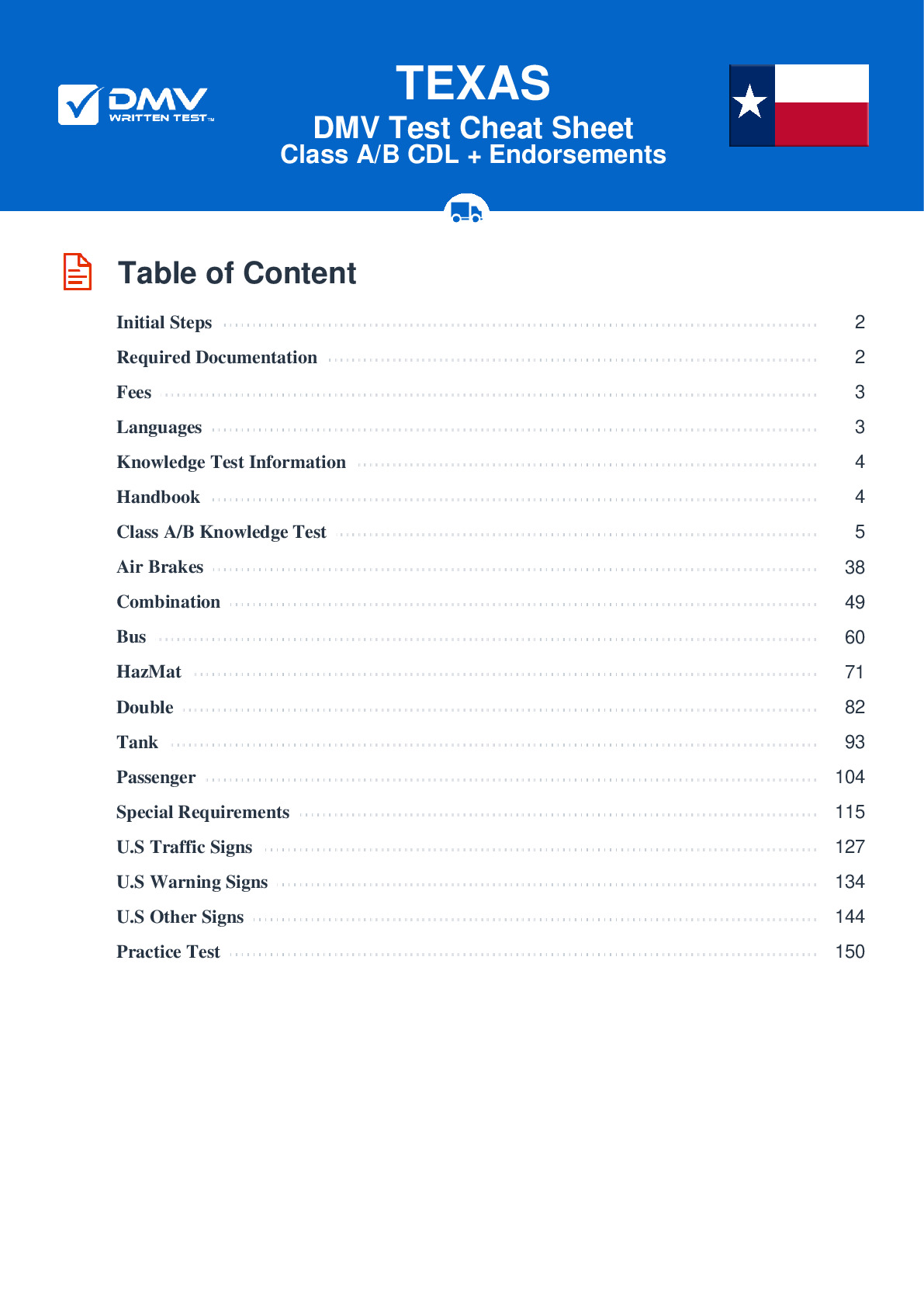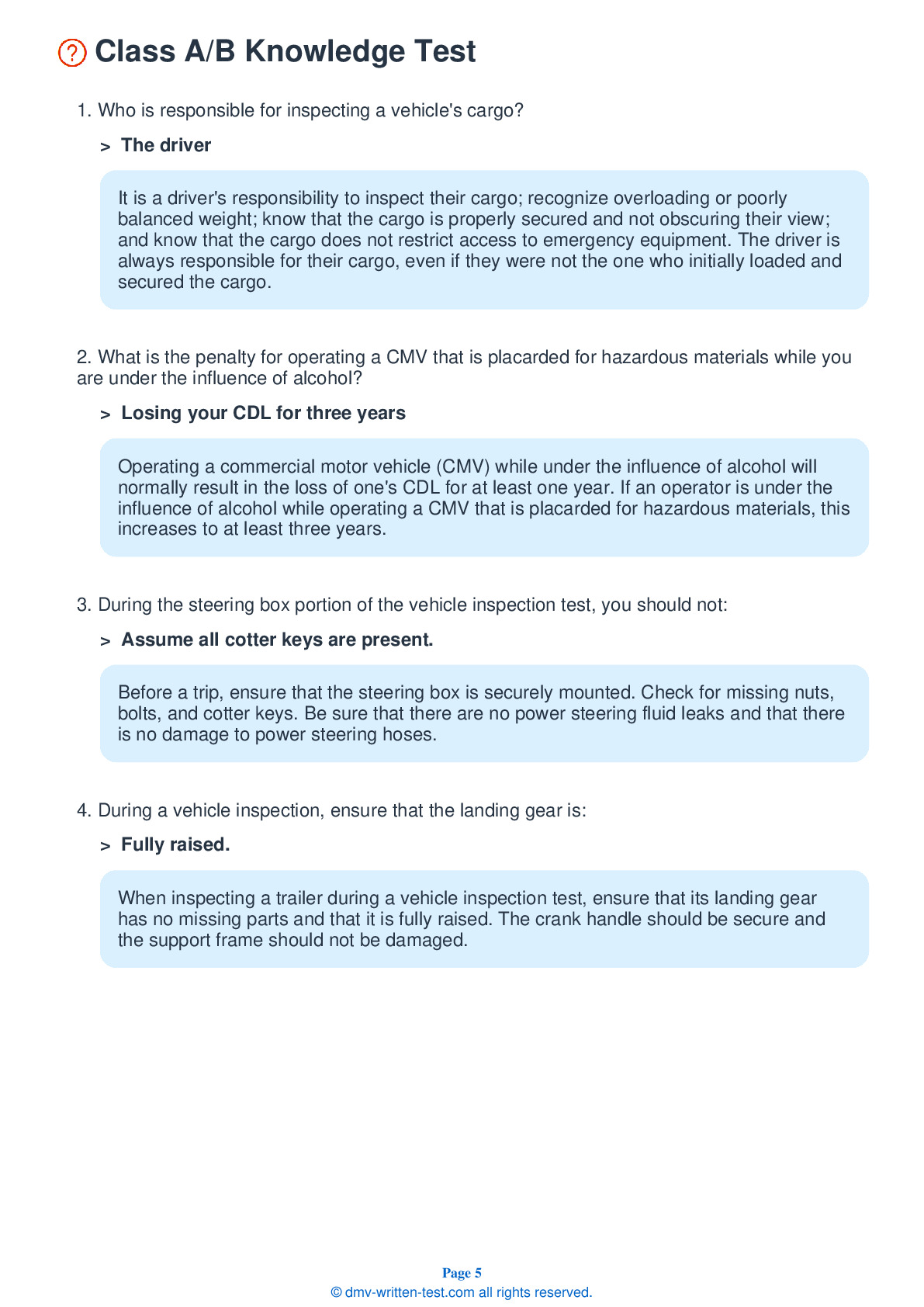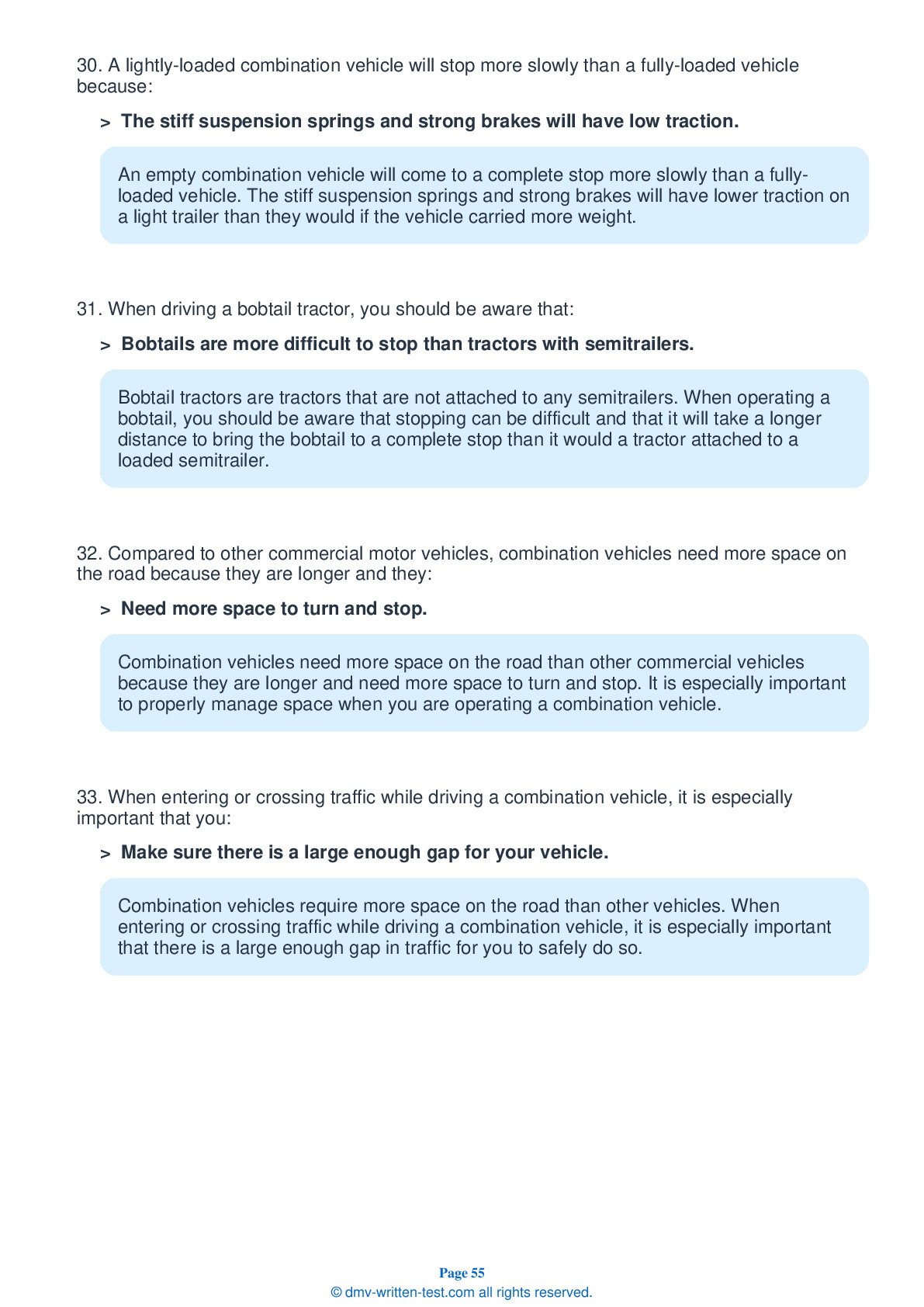Knowledge Test Class B
This license is required for driving a single vehicle with a GVWR of more than 26,001 pounds, and a trailer not to exceed 10,000 pounds gross vehicle weight rating, or a vehicle designed to transport 24 ore more people (including the driver)t. To receive this license, applicants must pass a 50-question test. Each question has four answer choices. To pass, applicants must answer 40 questions correctly. Test questions come from the Texas Commercial Motor Vehicle Drivers Handbook. Questions come from chapters covering: Introduction, Driving Safely, Transporting Cargo Safely, Air Brakes (if applicable), Combination Vehicles, Pre-Trip Vehicle Inspection Test, Basic Vehicle Control Skills Test and On-Road Driving. Endorsements that may be used with a Class B CDL are: Hazardous materials, Tank, Passenger, HazMat and Tank, Air Brakes and School bus.
36. While driving, spring brakes are generally held in place by:
While driving, spring brakes are generally held in place by air pressure. If the air pressure gets low enough, the springs will activate the brakes.
37. Before driving a vehicle with a dual air brake system, you must wait for the air compressor to build a minimum of ____ in both the primary and secondary systems.
Before driving a vehicle with a dual air brake system, you should wait for the air compressor to build up at least 100 psi in both the primary and secondary systems.
38. During the on-road driving test, you must do all of the following, except:
You must drive in a safe and responsible manner during the on-road driving test. This includes wearing your safety belt; obeying all traffic signs, signals, and laws; and completing the test without an accident or moving violation.
39. Drivers are usually the least alert:
Drivers are usually less alert when driving at night, especially after midnight.
40. If you experience a loss of hydraulic pressure, you should do all of the following, except:
If you experience a loss of hydraulic pressure in your brakes, you should downshift, pump the brakes, and use the parking brake. Seek an escape route, such as an escape ramp, open field, or side street.
41. If confronted by an aggressive driver, you should:
If confronted by an aggressive driver, it is most important to get out of their way. Avoid making eye contact and do not gesture at them. Report them to the appropriate authorities once you can safely do so.
42. When asked to complete a driver's side parallel parking maneuver, you should:
You may be asked to complete a parallel parking maneuver into a parking space that is to the left of your vehicle. You should drive past the parking space before backing into it while bringing the rear of your vehicle as close to the rear of the space as possible. Your vehicle should be completely within the boundaries of the space.
Frequently Asked Questions
To obtain a Class B CDL in Texas, you must meet the following requirements:
1. Be at least 18 years old (21 years old for interstate driving)
2. Hold a valid Texas driver's license
3. Pass a medical examination and obtain a medical certificate
4. Pass the written knowledge test for the Class B CDL
5. Pass the skills test in a vehicle that matches the class of license you are seeking
6. Pay the necessary fees for license issuance
It is important to note that additional endorsements may be required depending on the type of vehicle you plan to operate. For example, drivers of school buses must obtain a School Bus (S) endorsement and drivers of vehicles carrying hazardous materials must obtain a Hazmat (H) endorsement.
Some examples of vehicles that can be operated with a Class B CDL in Texas include:
1. Straight trucks
2. Large buses, such as city buses and tour buses
3. Segmented buses, such as those with two or three sections
4. Box trucks and delivery trucks
5. Dump trucks and cement mixers
6. Tow trucks (with certain endorsements)
7. Passenger vans (with certain endorsements)
It is important to note that additional endorsements may be required depending on the type of vehicle you plan to operate. For example, drivers of school buses must obtain a School Bus (S) endorsement and drivers of vehicles carrying hazardous materials must obtain a Hazmat (H) endorsement.
1. Be at least 18 years of age. However, you must be 21 years of age to operate a commercial vehicle across state lines or transport hazardous materials.
2. Hold a valid Texas driver's license.
3. Pass a medical examination and obtain a medical certificate, which can be obtained from a licensed medical examiner approved by the Federal Motor Carrier Safety Administration (FMCSA).
4. Pass the written knowledge test for the Class B CDL, which tests your knowledge of commercial driving rules and regulations.
5. Pass the skills test in a vehicle that matches the class of license you are seeking. This test consists of three parts: pre-trip inspection, basic vehicle control, and on-road driving.
6. Pay the necessary fees for license issuance.
It is important to note that additional endorsements may be required depending on the type of vehicle you plan to operate. For example, drivers of school buses must obtain a School Bus (S) endorsement and drivers of vehicles carrying hazardous materials must obtain a Hazmat (H) endorsement.
It is important to note that even though you can obtain a Class B CDL at the age of 18, some employers may require drivers to be at least 21 years old due to insurance requirements or company policies.
1. Passenger (P) endorsement: This endorsement is required for drivers who plan to operate vehicles designed to transport 16 or more passengers, such as buses.
2. School Bus (S) endorsement: This endorsement is required for drivers who plan to operate a school bus.
3. Hazardous materials (H) endorsement: This endorsement is required for drivers who plan to transport hazardous materials.
4. Tanker (N) endorsement: This endorsement is required for drivers who plan to operate a vehicle that transports liquids or gases in bulk containers with a capacity of 1,000 gallons or more.
5. Double/triple trailer (T) endorsement: This endorsement is required for drivers who plan to operate a vehicle with two or three trailers attached.
To obtain any of these endorsements, you will need to pass additional knowledge and skills tests beyond those required for the Class B CDL license.
1. Pre-Trip Inspection: You will be asked to do a pre-trip inspection of your vehicle, which includes identifying and explaining the function of various vehicle parts and equipment.
2. Basic Vehicle Control: You will be asked to demonstrate your ability to control the vehicle in a closed course setting. This includes backing up, turning around, and parking.
3. On-Road Test: You will be asked to drive the vehicle on public roads, while demonstrating your ability to safely operate the vehicle in various traffic situations.
During the skills test, you will be evaluated on your ability to perform each task safely and correctly. It is important to note that the vehicle used for the test must represent the type of vehicle you plan to operate with your Class B CDL license. For example, if you plan to operate a bus with air brakes, you must take the skills test in a bus with air brakes.
Additionally, you must bring a vehicle that meets specific requirements for the test, such as a valid registration and proof of insurance.
1. Passenger Restrictions: If you have a Class B CDL with a "P" endorsement for passenger transport, you are not allowed to operate a vehicle designed to carry more than 16 passengers, including the driver.
2. Hazardous Materials Restrictions: If you have a Class B CDL with an "H" endorsement for hazardous materials transport, you must follow strict rules and regulations for the handling and transportation of hazardous materials.
3. Air Brake Restriction: If you took your skills test in a vehicle without air brakes, your Class B CDL will have an air brake restriction. This means you are not allowed to operate a vehicle with air brakes.
4. No Tractor-Trailer Operation: A Class B CDL does not allow the driver to operate a tractor-trailer combination vehicle with a weight of 26,001 pounds or more.
It is important to note that these restrictions may vary by state and may be subject to change. It is also important to check with the Texas Department of Public Safety for the most up-to-date information on Class B CDL restrictions and limitations.
However, it is important to note that the skills test for a Class B CDL must be taken in English. This is because the examiner needs to be able to communicate with you in English during the test to ensure your safety and the safety of others on the road.
If you plan to take the Class B CDL written test in a language other than English, you must notify the DPS when you schedule your appointment. Additionally, you may need to bring a translator with you to assist with any communication issues that may arise during the test.
To request accommodations for the written test, you must contact the DPS at least 30 days before your scheduled appointment. You will need to provide documentation of your disability and the specific accommodations you need. Some examples of accommodations that may be provided include:
1. Extended testing time
2. Use of a reader or scribe
3. Special testing equipment or software
4. Assistance from a sign language interpreter
The DPS will review your request and determine if the accommodations can be provided. If your request is approved, the DPS will work with you to schedule a testing appointment that accommodates your needs.
It is important to note that accommodations for the skills test may be more difficult to provide due to safety concerns and the need for consistent testing procedures. However, the DPS will work with you to determine if any reasonable accommodations can be made for the skills test as well.
It is important to note that there is a limit to the number of times you can retake the written test. If you fail the test three times, you will have to wait 90 days from the date of your last attempt before you can take the test again.
To increase your chances of passing the written test, it is important to study and prepare thoroughly. The Texas DPS offers a Commercial Driver's Handbook that covers all of the information you need to know for the written test. You can also find practice tests online or through commercial driving schools. Additionally, consider taking a commercial driving course to help you prepare for both the written and skills tests.




